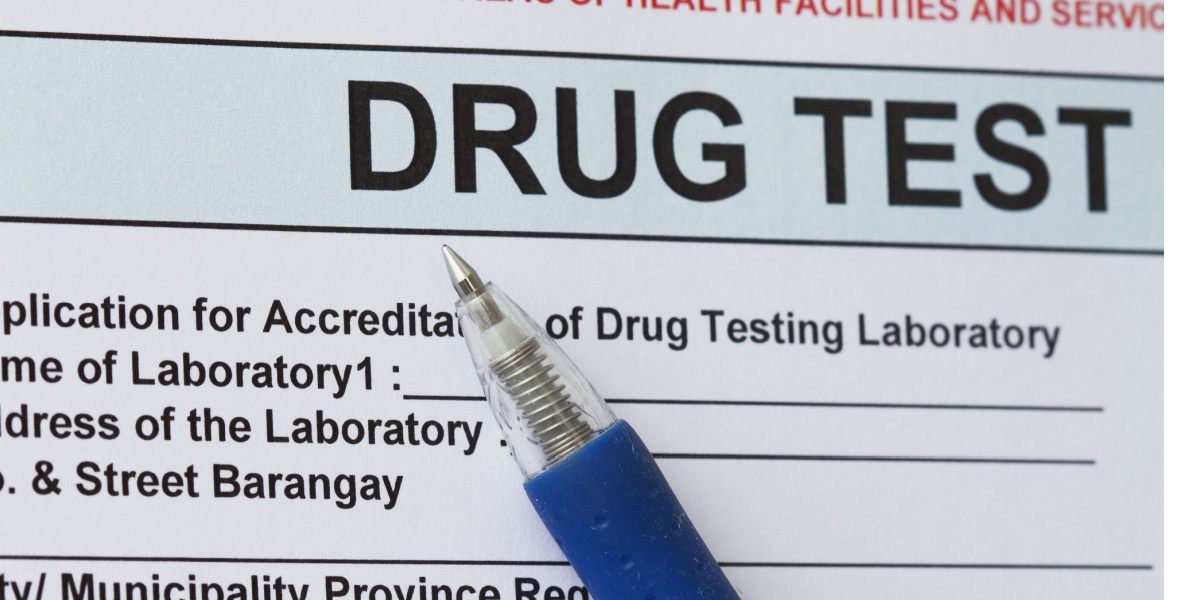Some jobs require drug testing before and during employment and the laws around this can vary depending on the industry and state. Because of these differences and the ongoing changes to substance regulations, it can be unclear on current policies and requirements of employment drug tests.

Understanding employment drug testing and the law
Drug testing can occur during pre-employment checks or at various times during employment. These will typically test for amphetamine, cocaine, marijuana, opiates, and phencyclidine, although some tests include additional substances. Most often, this will be tested with urine screening, although some employers might also use hair, saliva, or blood tests. [1]
In some industries, it is a requirement to receive pre-employment and regular drug testing. For many job roles, drug testing is not required by law, but may be requested for certain reasons at the discretion of the employer. Drug testing is conducted to ensure the safety and productivity of employees. [2]
For a full rundown on how to create a drug-free workplace, visit our Drug and Alcohol Resources for Employers page.
Federal employment drug testing laws
Various laws are in place in the United States that impact drug testing policies, including: [1][3]
- Drug-Free Workplace Act of 1988: States that employers must enforce drug testing policies when receiving federal contracts of $100,000 or more, or federal grants of any amount. This act ensures employers prohibit and establish awareness of drug use and inform employees of the consequences.
- Family and Medical Leave Act: This act allows employees up to 12 weeks of unpaid leave from work to address their own or their family member’s serious medical conditions. This includes drug and alcohol addiction treatment programs.
- Title VII of the Civil Rights Act of 1964: This act prohibits employers from discriminating against individuals based on race, nationality, religion, or color. This means that employers cannot request drug tests based on protected characteristics.
- Americans with Disabilities Act: This act prohibits the discrimination of employees due to disability. Employers cannot refuse to hire someone based on past substance use or engagement in a rehabilitation program (this does not apply to current circumstances).
- National Labor Relations Act: This act states that an employer in a unionized workplace must discuss and negotiate with the union before implementing drug testing policies.
- Drug testing laws in specific industries
Certain industries also uphold specific regulations, including: [1][3]
- Omnibus Transportation Employee Testing Act of 1991: Drug testing is mandatory for employees working in the transportation industry, including the Department of Transportation, Federal Aviation Administration, Federal Railroad Administration, Federal Transit Administration, and Nuclear Regulatory Commission. Employees must comply with their agency's regulations relating to drug testing.
- Department of Defense Regulations: Employees with access to classified and sensitive information must adhere to drug-free workplace policies and drug testing.
Industries in which drug testing is often required or conducted include: [3]
- Healthcare and hospital workers
- Transportation
- Government
- Automotive
- Manufacturing
Pre employment drug testing laws by state 2025
| State | Which employers does this apply to? | Can employers conduct pre-employment tests? | Can employers dismiss or refuse to hire based on refusal or positive results? | Is marijuana use legal? |
|---|---|---|---|---|
| Alabama | All | After giving a conditional job offer and informing the applicant of the drug testing policy. | Yes | No |
| Alaska | All | Yes, no restrictions | Yes | Yes, both medical and recreational |
| Arizona | Private employers, school district transportation agencies, school districts | After informing the applicant of the drug testing policy.Requirement for school bus drivers. | Yes | Yes, both medical and recreational |
| Arkansas | Federal regulations apply | Federal regulations apply | Federal regulations apply | Yes, medicinal use only |
| California | State agencies | Requirement for drivers of public transportation.Permitted for applications to state agency roles in positions of sensitivity. | Yes | Yes, both medical and recreational |
| Colorado | Federal regulations apply | Federal regulations apply | Federal regulations apply | Yes, both medical and recreational |
| Connecticut | Private sector employees | After informing the applicant of the drug testing policy.Industries exempt from the rule: construction, mining, educational services, utilities, justice, transportation or delivery, public order and safety activities, manufacturing, healthcare or social services, national security, and international affairs. | Yes | Yes, both medical and recreational |
| Delaware | Public and private schools, school transportation, Department of Corrections | Requirement for security positions within the Department of Correction and for school bus drivers. Can be conducted any time before the start of employment. | Yes | Yes, medicinal use only |
| Florida | Public employers of law enforcement and safety-sensitive roles.Private employers with three or more employees. | After informing the applicant of the drug testing policy. | Yes | Yes, medicinal use only |
| Georgia | Public schools, school transportation agencies, state government employers, and private employers. | Permitted for applications to positions in public schools, state government, and private companies. | Yes, and applicants might be unable to apply to roles in state agencies or public schools for 2 years. | No |
| Hawaii | All | After informing the applicant of the drug testing policy and permitting them to disclose prescription and nonprescription substances.Requirement for civil service applicants in Honolulu. | Yes | Yes, medicinal use only |
| Idaho | All | Any time before starting employment, if all requirements are stated within the company’s policy. | Yes | No |
| Illinois | All | Any time before starting employment, if all requirements are stated within the company’s policy. | Yes | Yes, both medical and recreational |
| Indiana | Federal regulations apply | Federal regulations apply | Federal regulations apply | No |
| Iowa | Public and private employers | Only if the applicant has been informed of drug testing and the job role advertisement gives notice of drug testing | Yes | No |
| Kansas | State government | For safety-sensitive jobs after an offer has been given. Job advertisements must give notice of drug testing. | Yes | No |
| Kentucky | Federal regulations apply | Federal regulations apply | Federal regulations apply | No |
| Louisiana | Public and private employers need not utilize a federally-mandated testing program | Any time before starting employment, if all requirements are stated within the company’s policy. | Yes | Yes, medicinal use only |
| Maine | Public and private employers | After informing the applicant of the drug testing policy. | Yes | Yes, both medical and recreational |
| Maryland | All | Any time before starting employment, if all requirements are stated within the company’s policy. | Yes | No |
| Massachusetts | Federal regulations apply | Federal regulations apply | Federal regulations apply | Yes, both medical and recreational |
| Michigan | Federal regulations apply | Federal regulations apply | Federal regulations apply | Yes, both medical and recreational |
| Minnesota | Public and private employers | After informing the applicant of the drug testing policy and conditional offer given | Yes | Yes, medicinal use only |
| Mississippi | Public and private employers | Any time before starting employment, if all requirements are stated within the company’s policy. | Yes | Yes, medicinal use only |
| Missouri | Federal regulations apply | Federal regulations apply | Federal regulations apply | Yes, medicinal use only |
| Montana | Public and private employers | For certain industries and positions, including transport, hazardous environments, safety, and security. | Yes | Yes, both medical and recreational |
| Nebraska | Public employers and private employers with six or more employees | Any time before starting employment, if all requirements are stated within the company’s policy. | Yes | No |
| Nevada | State agencies | For public safety positions, at any time before starting employment, if all requirements are stated within the company’s policy. | Yes | Yes, both medical and recreational |
| New Hampshire | Federal regulations apply | Federal regulations apply | Federal regulations apply | Yes, medicinal use only |
| New Jersey | All | Any time before starting employment, if all requirements are stated within the company’s policy. | Yes, but does not apply to cannabis use outside of work | Yes, both medical and recreational |
| New Mexico | Federal regulations apply | For zero-tolerance drug testing programs.Where company policies require drug testing, results must be submitted before final interviews. | Yes | Yes, both medical and recreational |
| New York | Federal regulations apply | For some security-sensitive and safety roles | Yes | Yes, both medical and recreational |
| North Carolina | Public and private employers | Any time before starting employment, if all requirements are stated within the company’s policy. | Yes | No |
| North Dakota | Federal regulations apply | Federal regulations apply | Federal regulations apply | Yes, medicinal use only |
| Ohio | All | After giving notice with a job offer | Yes | Yes, medicinal use only |
| Oklahoma | Public and private employers | After giving notice and a conditional job offer. Notice must be in writing with clear information on methods, procedures, and policies. | Yes | Yes, medicinal use only |
| Oregon | All | If there is reasonable suspicion. | Yes | Yes, both medical and recreational |
| Pennsylvania | Federal regulations apply | Federal regulations apply | Federal regulations apply | Yes, medicinal use only |
| Rhode Island | Public and private employers | In the private sector after a conditional offer is given.In the public sector for safety jobs or when required by federal law | Yes | Yes, medicinal use only |
| South Carolina | All | Any time before starting employment, if all requirements are stated within the company’s policy. | Yes | No |
| South Dakota | State government | For safety-sensitive jobs after an offer has been given. Job advertisements must give notice of drug testing. | Yes | Yes, both medical and recreational |
| Tennessee | State department of corrections | Any time before starting employment, if all requirements are stated within the company’s policy. | Yes | No |
| Texas | Federal regulations apply | Federal regulations apply | Federal regulations apply | No |
| Utah | Private employers, state institutions of higher education, and local government agencies | In the private sector.In local governments and state colleges after giving a notice and informing of the drug testing policy. | Yes | Yes, medicinal use only |
| Vermont | Public and private employers | After giving advance notice and a conditional job offer.If the test forms part of the pre-employment physical exam. | Yes | Yes, both medical and recreational |
| Virginia | Federal regulations apply | Federal regulations apply | Yes, does not apply to cannabis oil that has been prescribed by a healthcare practitioner | Yes, both medical and recreational |
| Washington | Private employers wishing to qualify for 5% workers’ compensation and premium discount (after approval by state authorities) | After giving notice and a conditional job offer to the applicant | Yes | Yes, both medical and recreational |
| West Virginia | Federal regulations apply | Federal regulations apply | Federal regulations apply | Yes, medicinal use only |
| Wisconsin | Federal regulations apply | Federal regulations apply | Federal regulations apply | No |
| Wyoming | Federal regulations apply | Federal regulations apply | Federal regulations apply | No |
What protection do employees have?
- Refuse a drug test: Employees can refuse a drug test, although this may result in being dismissed or disciplined in the same manner as a positive test result. State laws may vary regarding the consequences of this.
- Expect confidentiality: Drug test results must be kept confidential, along with any consequences of positive results.
- Expect certified testing: Drug tests must take place in certified laboratories or conducted by a trained collector.
- Dispute results: Employees can dispute the results of a test, particularly if they believe a prescribed medication has shown as an illicit substance. In this instance, employees should gather evidence and discuss this with the Medical Review Officer (MRO). In some cases, it may be necessary to seek legal advice on this.
- Request a retest: Employees can request a retest within the first 72 hours of test results. In most cases, this will involve retesting the same sample and will be conducted at the employees’ own expense.
- Expect to be informed and notified: Employees must receive all information about drug testing policies, how and when drug tests are carried out, and the consequences of positive results. They must also give consent before testing.
- Expect equal rights: All employees of equal positions should receive the same testing and there should be no discrimination based on the person or their background.
What rights do employers have?
- Use drug testing as a condition for hiring: State laws vary but most employers can state that a drug test is necessary before hiring an employee and that a positive result will result in a failed application.
- Decide disciplinary action: Employers can decide the consequences of a positive drug test result, which may involve referring the employee to specialist services or employment termination.
- Conduct regular testing: Employers can conduct drug testing regularly, at random, post-accident, or with reasonable suspicion. State laws may vary on this.
- Terminate employment: Employers can dismiss an employee who refuses or fails a drug test. State laws may vary.




